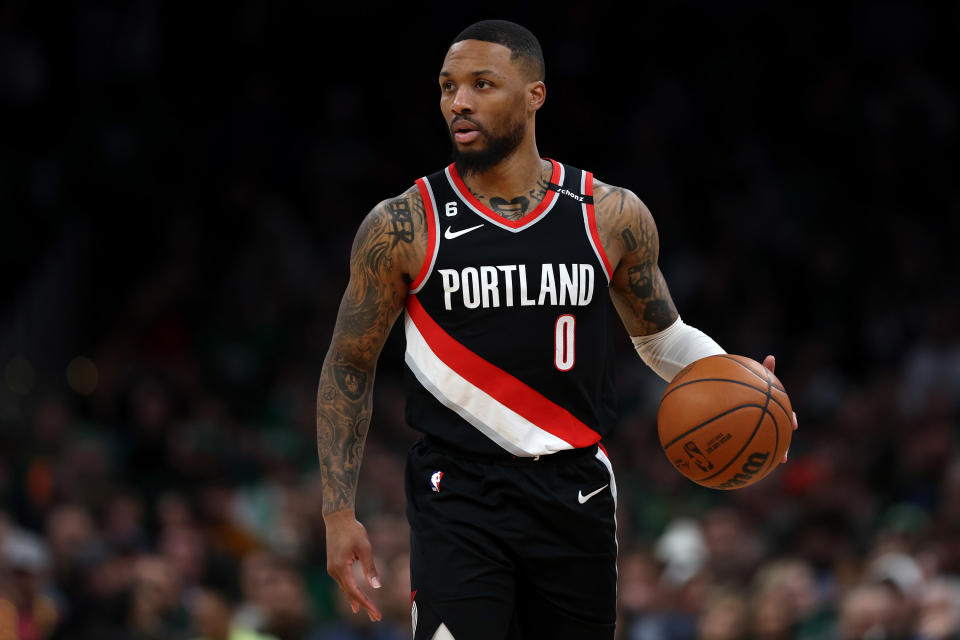Should the Bulls trade for Damian Lillard or Buddy Hield? Exploring the pros — and cons — of both stars.

CHICAGO — Training camp begins soon for the Chicago Bulls — but that hasn’t slowed the NBA trade rumor mill, which continues to churn as key players seek new homes for the 2023-24 season.
After two conservative seasons, should executive vice president of basketball operations Artūras Karnišovas and the front office make a major move?
Speculation surrounding a Damian Lillard trade reignited this week after Kyle Neubeck of PHLY Sports reported the Bulls have entered conversations to negotiate a multi-team trade to “get into the Lillard sweepstakes.” A day later, The Athletic reported Buddy Hield is seeking a trade from the Indiana Pacers, making one of the best 3-point shooters available.
Both Lillard and Hield are enticing options for the Bulls, but a path to landing either star is unclear.
Let’s start with the big one: could the Bulls land Lillard?
The Bulls have floated around the outskirts of the Lillard negotiations — which appears to be thoroughly focused on Miami as a final destination — throughout the summer. NBC Sports Chicago’s K.C. Johnson reported in July the Bulls “engaged in preliminary conversations” with Portland over a Lillard-Zach LaVine swap.
LaVine acknowledged those rumors during an interview with NBC Sports Bay Area ahead of July’s American Century Championship golf tournament, saying his name has been placed in trade discussions for the Bulls before.
“When there’s smoke, there’s fire,” LaVine said. “Every once in a while, you see a little bit too much smoke.”
A Lillard-LaVine trade would be a like-for-like swap between two players with relatively similar skill sets. On paper, it’s clear why this would feel like an upgrade for the Bulls: Lillard averaged 32.2 points, 7.3 assists and 4.2 makes from behind the arc last season, while LaVine logged 24.8 points, 4.2 assists and 2.6 makes from three.
Lillard admittedly had less of a supporting cast around him in Portland, which was the central crux of his decision to push for a trade. But the seven-time All-Star still represents a decisive step up as a centerpiece star — bigger name, more veteran status, proven ability to show up in the postseason.
Still, making this trade would not fundamentally change the structure of the Bulls roster, which has struggled to produce postseason results over the past two seasons. It would still anchor the offense around a Big Three pairing of offensive-minded All-Stars — this time slightly older, albeit with more playoff experience.
Lillard is five years older than LaVine, making him slightly more expensive, plus the Bulls would be on the hook for his $121.8 million extension that picks up in 2025. His acquisition would likely cost the Bulls a young player like Coby White or Patrick Williams, both of whom have been investment pieces who are hoped to pay dividends in upcoming seasons.
Making such a move would further diminish the supporting lineup for the Bulls, a gamble that would rely on either Lillard’s ability to absorb the loss or another young rotational player to step up and fill the gap.
Whether or not the Bulls can land this trade, it forces the front office to answer a key question: is LaVine the only thing holding this team back? Barely a year after signing LaVine to a maximum contract, the best hope for the Bulls is to answer that question with a commanding “no.”
The Bulls have yet to emerge as a major target for Lillard or Portland, which could force them to switch tactics and chase a multi-team trade to get into the mix.
If the Bulls don’t swing for the fences with Lillard, should they turn their attention back to the East and snag Hield?
Hield is one of the most consistently prolific sharpshooters in the league; he shot 42.5% from 3-point range last season and averaged 40.3% from on 9.3 attempts per game over the past six seasons. For a Bulls team that finished dead-last in attempts and makes from behind the arc last season, Hield’s prowess would be a welcome change to an at-times sluggish offense.
The problem for the Bulls when it comes to Hield is twofold: how to put together an offer that won’t be laughed off and how to pay Hield if they somehow land him.
Unlike with the Lillard proposition, the Bulls don’t have a like-for-like option to offer the Pacers, who already have a LaVine-style guard in Tyrese Haliburton who occupies that figurehead star role. And if the Pacers lose their best 3-point shooter, they will undoubtedly hope to offset the loss to their own shooting, something the Bulls have little to offer in return.
The Bulls might be able to compensate the Pacers through draft picks, but they just emerged from the draft-day burden created by trading for Nikola Vučević in 2021 and may feel wary of returning to that position.
Even if they did land Hield, the prospect of meeting his financial expectations isn’t an easy one for the Bulls, who have been skittish about stepping into luxury tax territory.
Hield is the second-highest paid player on the Pacers roster behind Haliburton after originally inking a four-year, $90 million deal with the Sacramento Kings. The Athletic’s Shams Charania reported the Pacers offered Hield an extension, but the proposal “did not make the seven-year guard feel desired” — which means he aims to get paid, a prospect the Bulls would struggle with without hitting the cap.
Bulls fans have been anxious to see the front office shake things up through several trade deadlines of inaction, but the phrase “continuity” has become a well-worn drum beaten early and often by Karnišovas.
As the Bulls prepare for training camp — which will begin Oct. 3 in Nashville, Tenn. — it seems reasonable to expect the roster to remain unchanged.

